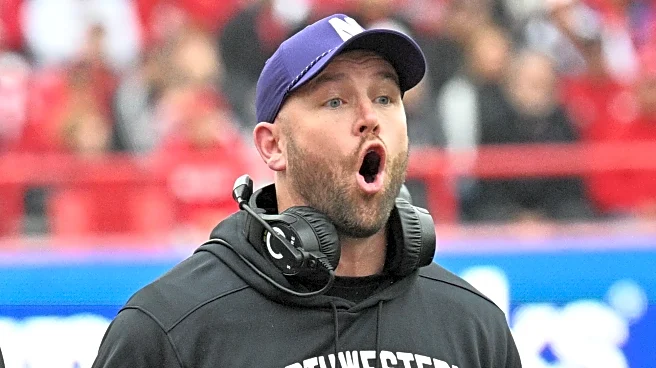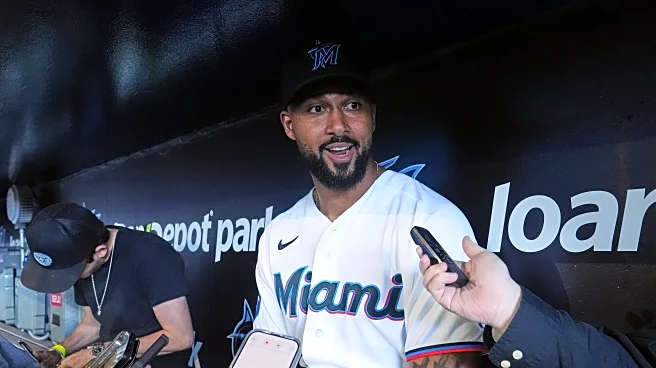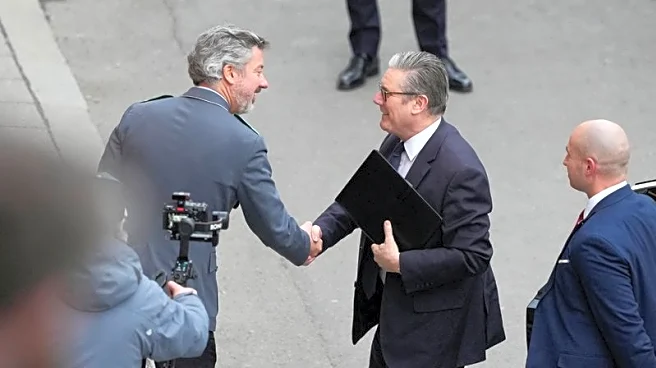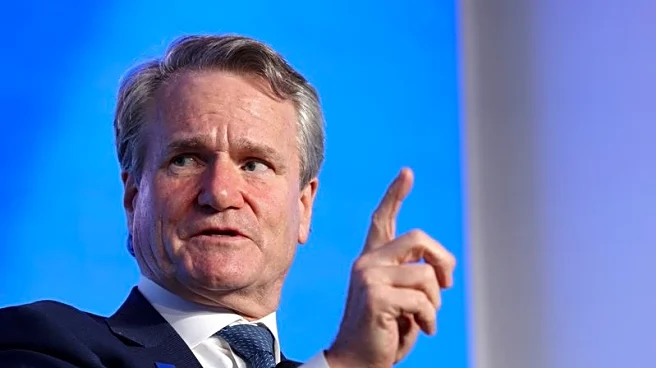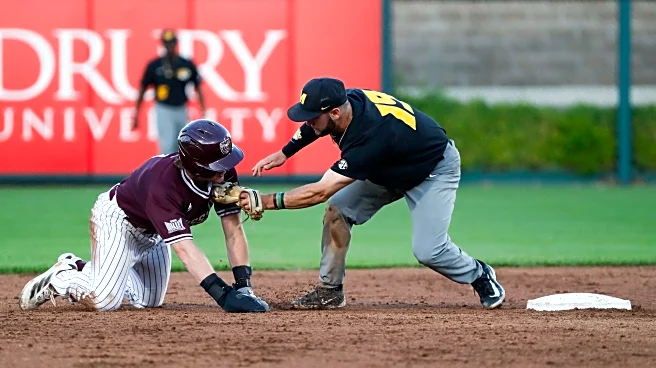After a well-earned bye week, Northwestern football is back in action this Friday night against No. 20 USC. The Trojans will be less rested, but also found a way to do what the Wildcats could not last
weekend in a road victory over Nebraska. Here’s everything David Braun had to say on his team’s weeknight trip to Los Angeles.
Note: This transcript has been edited for brevity and clarity.
Opening Statement: “Excited about where this football team’s at right now. Continued to progress over the last couple weeks. We have an incredible challenge in front of us this week, playing on a Friday night, on the road against a very good football team. There are no weaknesses with this USC team. They have an explosive offense, very talented defense, very efficient in their special teams play. They’re incredibly talented in all three phases, at all three levels, and very well-coached. With the style of offense that they play, it can be easy to fall into thinking that they’re passing the ball over the place, but that’s not the case. They’re very balanced. They’re running the ball very effectively, throwing the ball at a really high level, it’s a scary operation. And defensively, the talent up front is something that really stands out. Ultimately, the way that USC went into a hostile environment at Nebraska and found a way to win the football game, I think, is reflective of where Coach (Lincoln) Riley has this team. They’re finding ways to win football games. They’re undefeated at home right now. They’re 4-1 in the Big Ten. It’s gonna be an incredible challenge. But it’s something that this group is looking forward to.”
On how the team used the bye week: “We really challenged our team coming off the Nebraska loss. We said, ‘This can either be something that weighs us down for a couple days, or it can be utilized as a springboard for us to get back to work and find ways to get better and address things that need to be addressed.’ And the challenge over the bye week, the mission, was to fine-tune the engine. And that looks a lot of different ways for a lot of different people, but part of it was getting getting our group back to as full health as possible, finding some young guys that can continue to develop in their roles, whether it be on special teams, offense or defense, and then, as a coaching staff, evaluating everything. Not redefining who we are, but addressing the things that that need to be corrected, and finding ways that as a coaching staff, we can put our players in a better position. But I’m proud of the way that this group has approached that even going back to our first day of work on Monday post-Nebraska.”
On what he learned from USC’s offensive struggles against Nebraska: “Nebraska, all year, has been one of the best in the country against the pass defensively. I thought Nebraska did a good job. At the end of the day, there’s always opportunities as you evaluate film and evaluate what other people have done of just taking context and taking information on things that we can utilize. I know USC is really proud of the way that they played, and excited about the win, they’re also probably frustrated with some of the things that they felt they left out there against Nebraska. But, I think it’s a testament to the quarterback, to Coach Riley, to that team. When it really counted in the second half, they found ways to make plays, and that’s a reflection of a good offense, of a good team.”
On Preston Stone’s health and mentality: “Ultimately, playing quarterback, or playing any position in this league, you’re not going to feel the same at this at this point during the season. This bye week was a great opportunity for us to be mindful of guys that have played a lot of football and work to get guys back to full health. But ultimately, Preston is a warrior. I mean, he continues to battle and he knows and understands like, the formula for us is that he’s got to play, He’s a winner, he’s got to play his brand of football, but part of that is not forcing the issue or forcing things. And when he’s not doing that, when he’s just playing in rhythm and playing within the offense, he’s going to position us to win a lot of football games.”
On USC’s running back depth: “I mean, it’s a credit to USC and the way that they built that roster. The depth that they have in that running back room is is really impressive, and it’s showing up right now with some of the injuries that they’ve seen in that room. But they haven’t missed a beat, and ultimately, they’re going to find ways to stress you with their tempo. They’re going to find ways to stress you with their diversity in the run frames that you’re going to see. Some of the gap scheme, especially out of spread formations, can be really difficult to defend. We’ve got to do a great job of playing with leverage. We’ve got to populate to the football. We have to tackle well, and when missed tackles do happen, we’ve got to do a great job of understanding our leverage. And our pursuit’s got to show up. But something that stands out, even after those injuries at the running back position for USC, is that their run game has continued to thrive, and Coach Riley has been committed to it. It’s a credit to him, too.”
On Caleb Komolafe’s success finding explosive plays: “I think it’s a combination of a lot of things. You know, it starts up front with our O-line and tight ends. Ultimately, a running back, the more reps that they get, the more comfortable they get in the rhythm that they get into. I think you can see Caleb starting to get into that rhythm and getting into a certain comfort level in the Big Ten and just really trusting the guys up in front of him. Ultimately, you know, a four-yard gain in the run game, it’s efficient. We’re gonna celebrate them and then go on to the next. But he’s found ways to be explosive, not by searching for the explosive play, just by trusting what he’s being coached, trusting that he can make people miss and break tackles. And the guys up front are doing a great job of straining and really getting connected, getting things set up that’s putting him in a position to do that.”
On injuries to Damon Walters, Josh Fussell and Ore Adeyi: “All those guys are going through different progressions. We’re hopeful that all those guys are going to be available for Friday, but we’ll know a lot more as we get into tomorrow’s practice.”
On learning from the experience of a tough road game at Nebraska: “I think there were a couple of false start penalties at Nebraska, which were uncharacteristic of this team. We’ve got officials around practice constantly in spring ball, fall camp and even during the season, but continuing to hone into that, making sure we’re playing disciplined football and not hurting ourselves. We have to do a better job of starting off the second half the right way. That kickoff return against Nebraska was a critical juncture in the game. And, you know, building our own energy and building our own momentum coming out of the half, and then ultimately, just trusting in our process in terms of the way that we practice and prepare guys for a road game. And again, each environment has its own uniqueness to it, but this week looks very similar in terms of our prep that we had for Penn State, and for Nebraska. In terms of crowd noise and finding the balance between a routine at practice, but also throwing some curve balls and creating some chaos for our guys and forcing them to respond.”
On the scheduling dynamics (USC has a short week, while Northwestern is off a bye): “I think you can play that a lot of different ways. Sometimes it’s like, ‘Oh, great, we got to come off a bye week.’ But sometimes you can acquire some rust throughout the bye week. As a coaching staff and support staff, we’re always concerned about a short week and a short turnaround. We experienced it for Western Illinois earlier this year. We experienced it last year with Maryland going on the road. Sometimes a short week can also almost be a good thing. You don’t overthink it, and you get out there and you get your guys prepared to play. But ultimately, the opportunity that we had in front of us was during last weekend, we had an opportunity to really focus on ourselves and begin our USC prep. We’ll also be mindful that this is a late bye week and an opportunity to get the team healthy. I was proud of the way that the guys handled last week, and so far this week, guys have been locked in, and you can tell that it’s a group that’s hungry to get back out on the field.”
On Anto Saka and Caleb Tiernan receiving invites to the Shrine Bowl: “It’s awesome. It’s awesome for those two guys individually. It’s awesome for this program. Ultimately, I think that is the first of more to come in terms of opportunities for guys on this team. And I voiced this to our team yesterday, when we were able to announce that news to both Caleb and Anto and the team — ultimately, this is a reflection of their individual hard work and commitment. It’s a testament to that, the longevity of that and the progress that they’ve seen and their performance on the field. And it’s also a reflection of this program and the success that we’re finding collectively. The thing I love about this group, the thing I love about Caleb Tiernan and Anto Saka, is that they don’t want that announcement in front of the team. They don’t want to make it about them. They just want to get to work and position themselves to be at their best, to go play really well Friday night. But it’s a huge credit to those two. And both those guys have meant so much to this program. They’ll continue to mean so much and continue to be great leaders and examples on this team.”
On Northwestern’s last opponent (Nebraska) playing its next opponent (USC): “It is a great tool. I mean, ultimately, we’re very familiar with Nebraska in terms of the recency of that game, we’re very familiar with our study of USC from when we began prep. Just an understanding of, How is USC attacking Nebraska? How could that potentially correlate to how they’re going to attack us? And ultimately, in the Big Ten, the thing that continues to show up is, you better be able to run the ball and stop the run. And a credit to USC. Nebraska may have found some efficiency in the run game, but ultimately SC was able to really bow up in the second half in critical moments. And again, I don’t know what the exact number was — I think it was somewhere around 230 yards — but SC was able to effectively run the football on the road in the Big Ten. That’s a winning formula in this league.”
On controlling the game through the possession battle: “Coach Riley and that offense, for years now, but now specifically at USC, it’s a scary operation. And if they’re able to find rhythm, watch out. Obviously it’s our defense’s job, when they’re on the field, to be disruptive and not allow SC to get into rhythm. And they’re going to make some big plays, and they’re going to find ways at times to get into rhythm. But how do we get them back out of rhythm? And then, obviously, one of your best defenses against a team like that is not allowing them to possess the football. So that all has to interconnect as we prepare for Friday. And ultimately, it’s not asking anything out of our offense or our team that’s any different than what we’ve talked about all year long. Ultimately, we have to win the rushing battle. And one of the natural results of winning the rushing battle, when you’re running the ball efficiently, is possessing the football, and that’ll have to show up Friday night.”
On the players’ leadership following the Nebraska loss: “I think it’s things as simple — but not easy — as the way that guys’ body language was on Saturday right after the game. They were obviously disappointed, frustrated, sad, heartbroken, but not pointing fingers, not hanging their heads. I mean, they were, like, chomping at the bit to get back to work. And I was — to be honest with you — I was curious, slash concerned, about what Monday would look like coming back in with the team. And we had an entire room, starting with our leaders, that were like on the edge of their seats. And even though it was an off day and we were simply reviewing film, they were like, ‘Coach. Give us the truth. Let’s get back to work.’ And again, that’s a credit to Cam Porter and Mac Uihlein and Carmine Bastone and Caleb Tiernan and Preston Stone. I mean, the list goes on and on. It doesn’t just start and end with our captains, but it’s as simple as just taking a snapshot of what our football team and what our leadership looks like a couple hours after the Nebraska game. And to the guys’ credit, you could tell they were already chomping at the bit to get back to work.”
On Evan Beerntsen’s success after transferring from the FCS: “Evan’s brought a lot of toughness. He’s brought a lot of consistency, a ton of experience. He’s played a ton of football, obviously. I was telling a pro scout the other day and this isn’t a knock on Evan — we were thrilled to get Evan into the program — but he has exceeded expectations. And again, what a credit to Evan in terms of being able to make that adjustment from the FCS level into the Big Ten. But it all started with a great approach in the winter, a great spring ball, a great summer, a great fall camp. There’s no complacency, no entitlement, he’s hungry to continue to get coached hard and get better. But he brings a certain level of attitude and demeanor about him that is a really, really positive influence in that room.”
On the opportunity for the team to travel to California, which several players and coaches have ties to: “I think it’s awesome for our players, awesome for even some of our coaches, who are from that area. Coach (Armon) Binns and his wife, they’re originally from Southern California, I know they’ll have a huge crowd out there with them. Coach (Aristotle) Thompson and his crew are going to have a huge crowd out there. I know a lot of our players will. Hayden Eligon II was even joking with me before warmups this morning, like, ‘Coach, I’m excited to get this crew out to Southern California, back to my old stomping grounds.’ It’s a really, really neat opportunity, and also a fun challenge, from a standpoint of: How do we approach it to best position our guys for a great performance Friday night? There’s a balance. You’ve gotta be thoughtful of it, but also at the same time, don’t over-complicate it. Get the guys in their rhythm, get them prepared to play. And when the ball goes down, and it’s time to kick off, then it’s time to get after it.”
On the team finishing in the red zone: “That’s something that we have explored endlessly, throughout the entire season, but specifically, as we’ve continue to go through a couple bye weeks now. Ultimately, you know, you can scream it louder. You can message it. You can put it up on the wall. You can talk about in a PowerPoint. At the end of the day, sometimes it becomes, like, you can almost get in your own head about it. We just need to communicate, get all 11 on the same page and execute at the same level that we execute in other areas of the field. It can be more difficult to execute in that area of the field because windows are tighter in the pass game and there’s more bodies in the box in the run game. But a lot of our issues in that area of the field have been things that are just about getting into the right spot in the pass game, being targeted right in the run game. Like those are the things that we’re imparting on our guys to focus on. And then from a coaching staff standpoint, you know, an exercise that we went through in our coordinator meeting last week is, it was all of our coordinators, and this is a credit to Coach Lujan, just in terms of his humility, like he wanted feedback from everyone. We went back and looked at every tight zone series. And we asked, what tendencies are you seeing? Tim, what are your thoughts here? Tim, what are things that challenge you in this area of the field? Like, we just had really good conversation around that. I know we talked a couple weeks ago about utilizing Ryan Boe at Purdue, that play didn’t end up going well. But there are elements of quarterback run game in that area of the field, there’s more bodies in the box that you have to evaluate. Lots of conversations around it. But what I want our players focused on is simply just doing the routine things well, in terms of executing. And with that execution level rising, touchdowns should take care of themselves.”
On the growth of Braden Turner: “Yeah, it’s been awesome. I mean, Braden has an incredible skill set. That nickel star position is by far one of the most difficult positions to play in college football. But the greatest growth I’ve seen is his consistency, his comfortability out on the field, the confidence that’s building, but also his physicality. Whether it be involved in a run fit from the perimeter or asking him to get down and get in the mix versus some bigger personnel groupings. With Yanni Karlaftis going down, his role has even increased more, and we’re going to need Braden to be at his best here on the back end of the season.”
On the college football coaching landscape: “Shoot, it’s hard. Ultimately, what you want to see in college football is that people that hold the position of a head coach are in it for the right reasons. And ultimately, it is more of a business than it’s ever been before with the money involved. But our ultimate task and charge is to help young men develop into men. And when you get a person that has that in mind, and understands what it looks like to develop young men, both as football players and people in that position, you hope that they have the time and the runway to do that. Those that have been in this situation that understand it, know that that’s a progression. And I know Coach (Curt) Cignetti has done an unbelievable job in a short amount of time at Indiana, but typically, that’s a progression. And not to dance around the question, but, you know, Craig Bohl at North Dakota State, I think they were 3-8 one season. I’m sure Craig was feeling some pressure up at NDSU. The following year, they go to the national quarterfinals, and the year after that, they win their first FCS national championship. But Craig, like, built it from the ground up. You hope that as people go through the hiring process, they have those things in mind. They’re really intentional about hiring the right person that’s going to build it the right way, and they give the program time to do that. And not to just give him a shout out, but one of the things I appreciate most about Mark Jackson is he gets football. He’s been in the inner workings of it with the Raiders and the Patriots and involved intimately with USC football when they were at their height. He gets what that progression looks like. But, yeah, there’s no doubt. It’s crazy right now.”
On any changes to his contract or the program as the landscape has shifted: “As we talked about post last year, we have to reimagine and not reinvent, but, like, evaluate everything. The hiring of Christian Sarkisian, the way that we’re structured as a staff, both operationally and communication lines, unlimited coaches. Now, are we where we need to be? No, but have we made progress and improvements? Absolutely. And that’s one of the things as a head coach you don’t exactly enjoy, but it’s just part of your job. Of those communications with Mark Jackson administration of like, ‘Okay, these are our goals.’ What are the things that we need to make sure that we’re doing to make those goals something that we think is not only realistic, but something that’s a sustainable model? What I feel abundantly confident in is that we got the support with Mark and others to build something really special at Northwestern.
On the areas he’s looking to improve on: “We don’t have to have the biggest staff in the country. We can do more with less. We can do more with efficiency and alignment. But again, continuing to evaluate, in the revenue sharing world, how many resources are we putting in the scouting and recruiting, retention piece of things? And then also, how are we maximizing our coaching staff? Some of the most critical times of the team’s development are in times that we’re supposed to be out on the road. And, like, in the old model, your 10 countable coaches that are directly coaching your guys are the ones that are also out on the road in May, which is a critical time, especially being in a quarter school. I would like us to continue to evaluate how we maximize that, to be best in scouting and recruiting, but also be very present with our team in those developmental times.”
